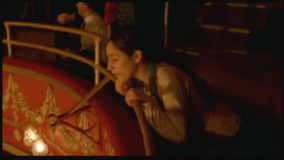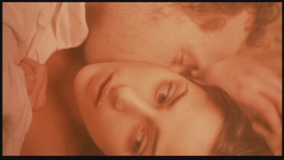|
Newest Reviews:
New Movies -
The Tunnel
V/H/S
The Tall Man
Mama Africa
Detention
Brake
Ted
Tomboy
Brownian Movement
Last Ride
[Rec]³: Genesis
Hara-Kiri: Death of a Samurai
Indie Game: The Movie
Abraham Lincoln: Vampire Hunter
Old Movies -
Touki Bouki: The Journey of the Hyena
Drums Along the Mohawk
The Chase
The Heiress
Show
People
The Strange Affair of Uncle Harry
Pitfall
Driftwood
Miracle Mile
The Great Flamarion
Dark Habits
Archives -
Recap: 2000,
2001, 2002,
2003, 2004
, 2005, 2006,
2007 , 2008
, 2009 ,
2010 , 2011 ,
2012
All reviews alphabetically
All reviews by star rating
All reviews by release year
Masterpieces
Screening Log
Links
FAQ
E-mail me
HOME
| |
Esther Kahn (Arnaud Desplechin, 2000)
 In order to study of the craft of acting instead of the
phenomena of the actor (funny how the two so often get confused in biopics…),
Arnaud Desplechin’s intensely realized Esther Kahn skimps on showing
off much charisma or glamour. That move might be off-putting to many viewers,
since so many stage-set dramas lean on those qualities in their performers to
draw in the audience, but because of the film’s intricately woven head-games,
the gambit pays off. Establishing a relationship between the life that occurs
onstage and off that’s deeper than few films outside of the oeuvre of Jacques
Rivette, Esther Kahn poses a series of fundamental questions about the
art of acting without ever quite answering any of them, but somehow it manages
to feel satisfying nonetheless. The early scenes, which show young Esther
(Summer Phoenix) as a young Jewish Londoner who is entirely dissatisfied with
the mundane nature of the “real world” and her family life, acutely trace
her experiential development, using a fisheye lens to highlight the sensations
that will one day be the foundation of her understanding of the world. Still,
the presence of camera tricks and voiceover narration doesn’t quite explain
exactly what it is that makes Esther sit with rapt attention when she goes to
the theater as a young woman.
In order to study of the craft of acting instead of the
phenomena of the actor (funny how the two so often get confused in biopics…),
Arnaud Desplechin’s intensely realized Esther Kahn skimps on showing
off much charisma or glamour. That move might be off-putting to many viewers,
since so many stage-set dramas lean on those qualities in their performers to
draw in the audience, but because of the film’s intricately woven head-games,
the gambit pays off. Establishing a relationship between the life that occurs
onstage and off that’s deeper than few films outside of the oeuvre of Jacques
Rivette, Esther Kahn poses a series of fundamental questions about the
art of acting without ever quite answering any of them, but somehow it manages
to feel satisfying nonetheless. The early scenes, which show young Esther
(Summer Phoenix) as a young Jewish Londoner who is entirely dissatisfied with
the mundane nature of the “real world” and her family life, acutely trace
her experiential development, using a fisheye lens to highlight the sensations
that will one day be the foundation of her understanding of the world. Still,
the presence of camera tricks and voiceover narration doesn’t quite explain
exactly what it is that makes Esther sit with rapt attention when she goes to
the theater as a young woman.
 Just as Desplechin never allows the audience to understand
what it is that fuels Esther to begin her career as an actress, he also keeps
her motivations obscured as she continues to develop. When her mentor (Ian Holm)
claims she lacks the life experience to express that ever-elusive truth on the
stage, she launches herself into what is clearly a self-destructive relationship
with a foreign literary critic, seemingly with the express intention of getting
her heart broken. The audience can never be sure whether or not she is only
dramatizing her relationship because she feels she needs to develop as an
actress. In the film’s stunning final set piece, she is afflicted by a severe
case of stage fright as she attempts to play the title role in Isben’s Hedda
Gabler. Attempting to determine whether the offstage trauma that
she’s undergoing is genuine or an extreme form of method acting becomes the
film’s dramatic crux, and it’s more than enough to hold the viewer’s
attention. Esther’s art simultaneously becomes a mechanism for her to cope
with life and a catalyst for a dehumanizing thought process that forces her to
dissect each of her life experiences, searching for some stage fodder in each of
them. It’s in her sacrifice of self for her craft that her accomplishments
(which the film tells us of, but frustratingly never really gets around to
showing us) inspire the greatest admiration. Esther’s extremism surely can’t
be representative of the craft of acting, but perhaps that’s what elevates her
to her purported greatness. It’s too bad that Phoenix’s performance
doesn’t exactly feel as if it came from that sort of hard-won internal
struggle, but its adequateness in conveying Kahn’s complexities keeps the film
from ever floundering.
Just as Desplechin never allows the audience to understand
what it is that fuels Esther to begin her career as an actress, he also keeps
her motivations obscured as she continues to develop. When her mentor (Ian Holm)
claims she lacks the life experience to express that ever-elusive truth on the
stage, she launches herself into what is clearly a self-destructive relationship
with a foreign literary critic, seemingly with the express intention of getting
her heart broken. The audience can never be sure whether or not she is only
dramatizing her relationship because she feels she needs to develop as an
actress. In the film’s stunning final set piece, she is afflicted by a severe
case of stage fright as she attempts to play the title role in Isben’s Hedda
Gabler. Attempting to determine whether the offstage trauma that
she’s undergoing is genuine or an extreme form of method acting becomes the
film’s dramatic crux, and it’s more than enough to hold the viewer’s
attention. Esther’s art simultaneously becomes a mechanism for her to cope
with life and a catalyst for a dehumanizing thought process that forces her to
dissect each of her life experiences, searching for some stage fodder in each of
them. It’s in her sacrifice of self for her craft that her accomplishments
(which the film tells us of, but frustratingly never really gets around to
showing us) inspire the greatest admiration. Esther’s extremism surely can’t
be representative of the craft of acting, but perhaps that’s what elevates her
to her purported greatness. It’s too bad that Phoenix’s performance
doesn’t exactly feel as if it came from that sort of hard-won internal
struggle, but its adequateness in conveying Kahn’s complexities keeps the film
from ever floundering.
* * * 1/2
01-11-03
Jeremy Heilman
|